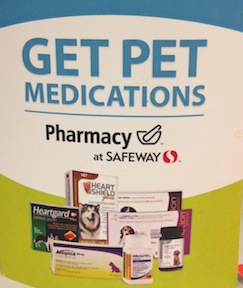
VIN News Service photo
Historically, pet owners obtained veterinary medications directly from their veterinarians. That’s changing, as pharmacies operated by online vendors, big-box stores and grocery chains such as Safeway increasingly vie for a piece of the market.
How pet medications reach the hands of pet owners and at what price is the focus of a hearing before a panel of Congress Friday.
The subject, long brewing in the veterinary community and explored in recent years by the Federal Trade Commission, will be taken up by the House Subcommittee on Commerce, Manufacturing and Trade. The hearing begins at 9:45 a.m. EDT and is slated to be
webcast live as well as recorded for online viewing.
A focus of testimony at the hearing is proposed legislation,
HR 3174, titled Fairness to Pet Owners Act of 2015, which was assigned to the subcommittee following the bill’s introduction last July.
The legislation would have the FTC write rules requiring veterinarians, when prescribing medication, to provide a prescription to the patient’s owner, whether requested or not. Veterinarians also would be prohibited from charging a fee for providing the prescription or requiring the owner to sign a waiver relieving the veterinarian from liability related to the medication. Veterinarians would be prohibited, as well, from requiring that medication they prescribe be purchased from them.
The legislation is not new — it was first introduced in 2011 and twice reintroduced — but this is the first time a legislative panel will consider the subject raised by the bill, according to Dr. Ashley Morgan, assistant director of the American Veterinary Medical Association Governmental Relations Division.
Morgan clarified that the hearing isn’t directly on the legislation. Rather, it’s an informational hearing about the pet medications industry. “Obviously, the two are linked, though,” she said.
Whether legislators might act on the bill Friday is unclear. A subcommittee staff spokeswoman was unable to say.
Morgan, however, said, “We’ve been told by subcommittee staff that they’d still need to hold a legislative hearing, subcommittee markup and full committee markup before the bill could go to the floor for a vote.”
The agenda for Friday’s subcommittee hearing, titled “The Pet Medication Industry: Issues and Perspectives,” shows testimony coming from:
• Tara Koslov, deputy director, FTC Office of Policy Planning
• Nathan Smith, vice president, True Science LLC
• Dr. John de Jong, chairman, AVMA board of directors
Written statements from each are posted online.
The FTC has been studying the issue since the Fairness to Pet Owners Act first was proposed. The agency held a
workshop on the topic in October 2012, and published a
staff report last May. The agency generally favors “prescription portability,” a consumer's ability to fill a prescription wherever he or she chooses.
Smith, an executive of an Idaho-based
company that markets pet medications, supplements and foods for dogs and cats, will speak in favor of the Fairness to Pet Owners Act.
In his written testimony, Smith questions the propriety of prescribers serving as exclusive sources of the drugs they prescribe. “ … it sets up a fundamental conflict of interest where the health care provider is also the retailer,” he states.
At the same time, he says: “This is not an ‘us vs. them’ type issue. We just see the marketplace — and its future potential — differently. We believe that if the market for pet medication is opened to competition, everyone will benefit — manufacturers, veterinarians, pet owners and pets alike.”
Smith argues that competition would bring down the cost of medications, giving pet owners more money to spend on pet care.
De Jong of the AVMA argues that the proposed law is not necessary. Most states — 36 at last count — have laws, regulations or policies requiring veterinarians to provide written prescriptions to clients on request; the AVMA ethics code does the same.
De Jong also raises questions about the quality of some medications obtained from sources other than veterinarians, and concerns about dispensing of drugs for veterinary patients by retail pharmacists, who are not routinely schooled in veterinary pharmacology.
In a
news release, subcommittee Chairman Michael Burgess, R-Texas, stated: “Our hearing ... will provide a forum to carefully examine whether federal involvement is needed in the veterinary prescription medication space. I believe the discussion will be robust on both sides of the issue.”
Other members of the subcommittee are:
Rep. Gus Bilirakis, R-Florida; Rep. Susan Brooks, R-Indiana; Rep. G.K. Butterfield, D-North Carolina; Rep. Tony Cardenas, D-California; Yvette Clarke, D-New York; Rep. Marsha Blackburn, R-Tennessee; Rep. Brett Guthrie, R-Kentucky; Rep. Gregg Harper, R-Mississippi; Rep. Joseph Kennedy, D-Massachusetts; Rep. Adam Kinzinger, R-Illinois; Leonard Lance, R-New Jersey; Rep. Markwayne Mullin, R-Oklahoma; Rep. Pete Olson, R-Texas; Rep. Frank Pallone Jr., D-New Jersey; Rep. Mike Pompeo, R-Kansas; Rep. Bobby Rush, D-Illinois; Rep. Janice Schakowsky, D-Illinois; Rep. Fred Upton, R-Michigan; and Rep. Peter Welch, D-Vermont.